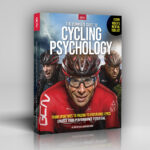Confidence is the single most important mental factor in cycling. Confidence is also a mental area that is ripe for change and I will not only be offering you insights into how confidence impacts your cycling performance, but, in my next several installments, I will also offer you many practical tools for developing confidence in your riding.
I define confidence as how strongly you believe in your ability to achieve your cycling goals. Confidence is so important because you may have the fitness to ride well, but if you don’t believe in that fitness, then you won’t ride up to your capabilities. For example, you may have demonstrated the fitness to ride a 25K time trial averaging 22 mph, but you won’t attempt that pace if you don’t have the confidence that you can successfully maintain it throughout the race.
Too often, cyclists are their own worst enemy rather than their best ally in training and races. When you ride, whose side are you on? Recognize that course wants to “beat” you with its distance, terrain, and road conditions and, if it’s a race, other riders in the field want to beat you. If you’re also against you, you don’t have a chance of overcoming those course conditions or hanging tough against the field.
Prime Confidence
Prime confidence is a deep, lasting, and resilient belief in your cycling ability, which includes your fitness, technique, tactics, and bike. With prime confidence, you are able to stay confident even when you’re not riding well. Prime confidence keeps you positive, motivated, intense, focused, and emotionally in control when you need to be, for example, during long training rides, exhausting interval workouts, or during races. You aren’t negative and uncertain in difficult conditions and you’re not overconfident under easy conditions. Prime confidence also encourages you to seek out demanding training and race situations and to view difficult conditions and tough fields as challenges to pursue. Prime confidence enables you to ride at your highest level consistently.
Vicious Cycle or Upward Spiral
To illustrate another influence of confidence, think back to a time when you didn’t have confidence in your cycling. You probably got caught in a vicious cycle of low confidence and performance in which low confidence and negative thinking led to poor riding, which led to les confidence, more negative thinking, and even poorer riding until your confidence was so low that you didn’t even want to get on your bike.
This vicious cycle usually starts with a bad day of training or a disappointing race result. Perhaps you are tired, nursing an injury, or just burned out by the stresses of life. This poor riding leads to negative self-talk: “I’m not feeling it. I can’t hang with this group. I’m done.” You are becoming your own worst enemy.
You start to get nervous before a tough ride or race because you don’t believe you are ready to ride well. All of that anxiety hurts your confidence even more because you feel physically uncomfortable and there’s no way you can ride well when you’re so uptight. The negative self-talk and anxiety causes negative emotions. You feel depressed, frustrated, angry, and helpless, all of which hurt your confidence even more and cause you to ride even worse.
The negative self-talk, anxiety, and emotions then hurt your focus. If you have low confidence, you can’t help but focus on all of the negative things rather than on things that will enable you to ride your best. All of this accumulated negativity hurts your motivation. As bad as you feel, you just don’t want to get out there on the road. If you’re thinking negatively, caught in a vicious cycle, feeling unmotivated, nervous, depressed, and frustrated, and can’t focus, you’re not going to have much fun on your bike and you’re not going to ride well.
Now recall when you have been really confident in your cycling. Your self-talk is positive: “I’m riding really well. I’m prepared to have a great race.” You are your best ally on your bike.
With the positive self-talk, you begin an upward spiral of confidence and riding in which positive thinking and more confidence leads to better riding, which leads to more positive thinking, more confidence, and even better riding.
All of the positive talk gets you feeling relaxed and energized as you begin a long training ride or challenging race. You have a lot of positive emotions such as inspiration and excitement. You focus on things you need to ride your best. Competing is actually an enjoyable experience for you, so you are really motivated to get on your bike and put in the miles.
If you’re thinking positively, riding an upward spiral, feeling motivated, relaxed, and energized, experiencing positive emotions, and are focused on riding your best, you’re going to have a lot of fun and you’re likely going to ride well.
Why Athletes Lose Confidence
Anything that counters your belief in your ability to achieve your cycling goals will hurt your confidence. The greatest disruption to confidence is feeling like you failed on your bike. Failure can mean bonking on a training ride, getting dropped by teammates, or having a poor result in a race. Failure will cause you to lose faith in your cycling ability and cause you to become unwilling to push yourself to, for example, attack a long climb or make a break from the peloton. There is nothing more harmful to confidence than failure because it suggests that any confidence you may have had in your riding is unjustified (even though periodic “failure,” whether of the muscle, bad day, or result variety, is a natural part of cycling).
Confidence is a Skill
A misconception that many cyclists have is that confidence is something that is inborn or that if you haven’t developed it early in your cycling career, you will never have it. In reality, confidence is a skill, much like technical skills, that can be learned. Just like with any type of cycling skill, such as taking corners fast or riding in a pace line, confidence is developed through focus, effort, and repetition.
The problem is that you have the option to practice good or bad confidence skills. If you are often negative about your cycling, you are practicing and ingraining those negative confidence skills, so when you go out for a difficult training ride or compete in a race, just like a bad technical habit, that negativity will come out and it will hurt your riding. In other words, you became highly skilled at something—being negative—that actually hurts your cycling.
If you have a bad technical habit, for example, you rock your upper body side to side while climbing out of the saddle, you probably have done that for a long time, so that bad riding habit is deeply ingrained. The result is that you have become skilled at riding that way. The same holds true for confidence. You can become skilled at being negative.
To change bad confidence skills, you must retrain the way you think and what you say to yourself. You have to practice good confidence skills regularly until the old negative habits have been broken and you have learned and ingrained the new positive skill of confidence.
Confidence Challenge
It’s easy to stay confident when you’re riding well, when the conditions are ideal, and when you’re racing against a field in which you’re one of the strongest riders. The real test of confidence, however, is how you respond when things aren’t going your way, for example, you’re riding into a stiff headwind or beginning to bonk late in a ride. I call this the Confidence Challenge.
Most cyclists who ride poorly get caught in the vicious cycle of low confidence and performance that I mentioned above. Once you slip into that downward spiral, you rarely can get out of it in the short term. In contrast, cyclists with prime confidence maintain their confidence and seek out ways to return to their previous level of riding. All cyclists go through periods where they don’t ride well.
What separates the best from the rest is that the best cyclists are able to maintain their confidence when they’re not in top form or are struggling with the conditions. By staying confident, they continue to work hard rather than give up because they know that, in time, their riding will come around. The skill in meeting the Confidence Challenge is not getting caught in the vicious cycle and to be able to get out of the down periods quickly.
There are several keys to mastering the Confidence Challenge.
- Develop the attitude that demanding situations are challenges to be sought out.
- Believe that experiencing challenges is a necessary part of becoming the best cyclist you can be.
- Be well-prepared to meet the challenges.
- Stay positive and motivated in the face of the difficulties.
- Focus on what you need to do to overcome the challenges.
- Accept that you may experience failure when faced with new challenges.
- Most importantly, never, ever give up!






